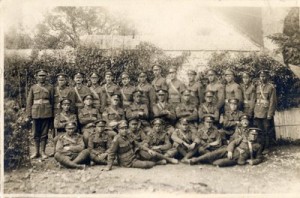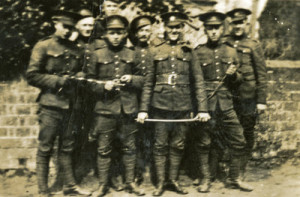The Laurier Military History Archive holds the original papers of Lieutenant Colonel William Merton Overton Lochead, Commanding Officer of the 118th (North Waterloo) Overseas Battalion. This battalion was comprised primarily of Canadians of German descent and suffered from a high level of desertion during its year in Canada. Our collection documents the establishment, recruiting and training of the battalion while it was stationed in Canada from December 1916 until December 1917. The file on desertion stands out due to the size and variety of records it contains. Enclosed are court martial documents, personal letters and memoranda that shed light on the seldom studied area of desertion in the Canadian military on the home front during the First World War.
During the Great War, desertion was a capital offence in the British and Dominion armies. While books by Teresa Iacobelli, Andrew Godefroy, and Chris Madsen examine the Canadian perspective on desertion, they mainly focus on what happened overseas on the Western Front. In comparison, desertion in Canada has not received the same level of attention. During the course of the war, most of the Dominion counties and towns raised battalions, but the experience of the 118th Battalion was much more complicated than most. Based out of Berlin (Kitchener after 1916) and encompassing the northern part of Waterloo County, an area settled mainly by German immigrants, local leaders hoped to raise an entire battalion in order to demonstrate to the rest of Canada that the area was loyal to King and country. Lochead aggressively pursued this goal by relaxing the regulations that his recruiters were asked to follow when enlisting local citizens. As a result, recruitment in Berlin and North Waterloo was bound to be controversial.
So, it is perhaps not surprising that a large number of deserters were recorded in the records of the 118th Battalion. The file, which has been digitized and is linked below, begins with a letter from Lt-Col. Lochead to the officer commanding the 1st Canadian Division stating that his recruiting efforts have been compromised because of the general disloyalty of the community and the unfortunate circumstance of young men fleeing to the United States to avoid recruitment. Interestingly, the file also includes several letters from the deserters themselves arguing that they fled for a variety of reasons. One deserter claims his actions were due to venereal disease, while another makes clear he deserted because of a casual bet he made with a fellow soldier. Never the less, the paperwork indicates that Lochead did not look at desertion as trivial matter and he pressed hard for the right to hand out severe punishments to deserters and seemed reluctant to accept the Governor General’s amnesty which was granted in the latter part of 1916. Despite this hard line, he was still willing to intercede on behalf of one 118th deserter who happened to be the son of a good friend. It would seem that in this case, Lochead was willing to bend the rules which illustrates the complexity of issues related to justice and punishment at home as well as overseas.
To capture less well-connected deserters, Lochead dispatched N.C.O’s to train stations and surrounding towns in order to prevent desertion to the United States. He also enlisted the help of local police and prison officials to track down and bring to justice deserters. These efforts, however, were largely in vain: the battalion’s records show ninety-two men deserted the 118th battalion during the period December 1915 to December 1916. These numbers were unusually high, given that the 118th only recruited around five hundred men. The desertion rate in the 118th was thus around twenty percent, although many were eventually rounded up and sent overseas.
Click here to read ‘Desertion’ from the Lochead Fonds
Bibliography
Godefroy, Andrew. For Freedom and Honour? The story of the 25 Canadian Volunteers executed in the Great War. Nepean: CEF Books, 1998.
Hayes, Geoffrey. Waterloo County: An Illustrated History. Waterloo: Waterloo Historical Society, 1997.
Iacobelli, Theresa. Death or Deliverance: Canadian Courts Marital in the Great War. Vancouver: University of British Columbia Press, 2013.
Madsen, Chris. Another Kind of Justice: Canadian Military Law from Confederation to Somalia. Vancouver: University of British Columbia Press, 1999.





searching for relation enlisted in 118 north waterloo batallion. think last name is Irwin
Do you have anything on the rugby play off with the 149th November 1916 in LONDON, ON?